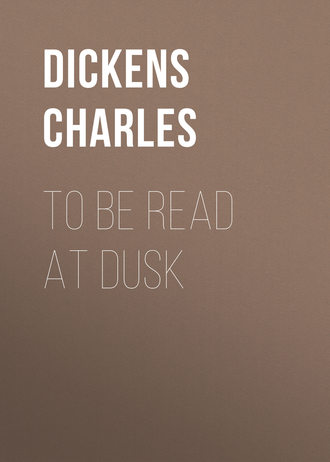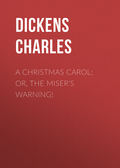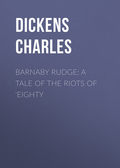
Чарльз Диккенс
To Be Read at Dusk
As there was a silence among them, I glanced around. He whom I took to be Baptista was lighting a fresh cigar. He presently went on to speak. He was a Genoese, as I judged.
‘The story of the English bride?’ said he. ‘Basta! one ought not to call so slight a thing a story. Well, it’s all one. But it’s true. Observe me well, gentlemen, it’s true. That which glitters is not always gold; but what I am going to tell, is true.’
He repeated this more than once.
Ten years ago, I took my credentials to an English gentleman at Long’s Hotel, in Bond Street, London, who was about to travel – it might be for one year, it might be for two. He approved of them; likewise of me. He was pleased to make inquiry. The testimony that he received was favourable. He engaged me by the six months, and my entertainment was generous.
He was young, handsome, very happy. He was enamoured of a fair young English lady, with a sufficient fortune, and they were going to be married. It was the wedding-trip, in short, that we were going to take. For three months’ rest in the hot weather (it was early summer then) he had hired an old place on the Riviera, at an easy distance from my city, Genoa, on the road to Nice. Did I know that place? Yes; I told him I knew it well. It was an old palace with great gardens. It was a little bare, and it was a little dark and gloomy, being close surrounded by trees; but it was spacious, ancient, grand, and on the seashore. He said it had been so described to him exactly, and he was well pleased that I knew it. For its being a little bare of furniture, all such places were. For its being a little gloomy, he had hired it principally for the gardens, and he and my mistress would pass the summer weather in their shade.
‘So all goes well, Baptista?’ said he.
‘Indubitably, signore; very well.’
We had a travelling chariot for our journey, newly built for us, and in all respects complete. All we had was complete; we wanted for nothing. The marriage took place. They were happy. I was happy, seeing all so bright, being so well situated, going to my own city, teaching my language in the rumble to the maid, la bella Carolina, whose heart was gay with laughter: who was young and rosy.
The time flew. But I observed – listen to this, I pray! (and here the courier dropped his voice) – I observed my mistress sometimes brooding in a manner very strange; in a frightened manner; in an unhappy manner; with a cloudy, uncertain alarm upon her. I think that I began to notice this when I was walking up hills by the carriage side, and master had gone on in front. At any rate, I remember that it impressed itself upon my mind one evening in the South of France, when she called to me to call master back; and when he came back, and walked for a long way, talking encouragingly and affectionately to her, with his hand upon the open window, and hers in it. Now and then, he laughed in a merry way, as if he were bantering her out of something. By-and-by, she laughed, and then all went well again.
It was curious. I asked la bella Carolina, the pretty little one, Was mistress unwell? – No. – Out of spirits? – No. – Fearful of bad roads, or brigands? – No. And what made it more mysterious was, the pretty little one would not look at me in giving answer, but would look at the view.
But, one day she told me the secret.
‘If you must know,’ said Carolina, ‘I find, from what I have overheard, that mistress is haunted.’
‘How haunted?’
‘By a dream.’
‘What dream?’
‘By a dream of a face. For three nights before her marriage, she saw a face in a dream – always the same face, and only One.’
‘A terrible face?’
‘No. The face of a dark, remarkable-looking man, in black, with black hair and a grey moustache – a handsome man except for a reserved and secret air. Not a face she ever saw, or at all like a face she ever saw. Doing nothing in the dream but looking at her fixedly, out of darkness.’
‘Does the dream come back?’
‘Never. The recollection of it is all her trouble.’
‘And why does it trouble her?’
Carolina shook her head.
‘That’s master’s question,’ said la bella. ‘She don’t know. She wonders why, herself. But I heard her tell him, only last night, that if she was to find a picture of that face in our Italian house (which she is afraid she will) she did not know how she could ever bear it.’
Upon my word I was fearful after this (said the Genoese courier) of our coming to the old palazzo, lest some such ill-starred picture should happen to be there. I knew there were many there; and, as we got nearer and nearer to the place, I wished the whole gallery in the crater of Vesuvius. To mend the matter, it was a stormy dismal evening when we, at last, approached that part of the Riviera. It thundered; and the thunder of my city and its environs, rolling among the high hills, is very loud. The lizards ran in and out of the chinks in the broken stone wall of the garden, as if they were frightened; the frogs bubbled and croaked their loudest; the sea-wind moaned, and the wet trees dripped; and the lightning – body of San Lorenzo, how it lightened!







